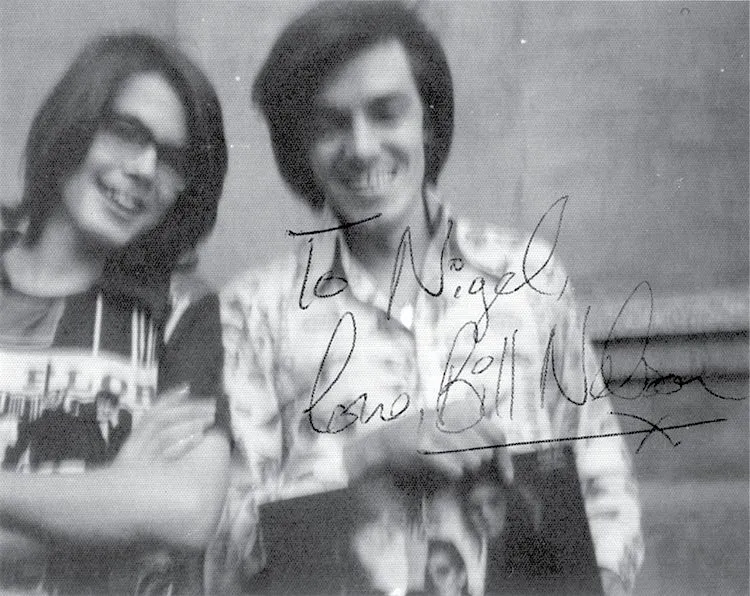Eddie bought into the rock myth, totally.
Forty years later, he’s still a true believer. Forty years later, if I want to know what’s going on in the British music scene, I still call him.
In return for helping out on his paper round, I got inducted into that teenage male world ahead of time, the world of girls and aftershave, racing bikes and clothes, penny round collars, Oxford bags, tight-fitting Fair Isle sweaters and platform shoes.
This was 1972.
I felt big when I was around Eddie and his friends. I got unconditional acceptance, like I got from Mom and Dad, but this was way cooler.
I remember the time he played me Bowie’s Hunky Dory album, my first exposure to that cultural giant of the seventies.
“You just wait, kid,” Eddie said. “Bowie’s going to be huge. We’ve got tenth-row tickets for his Town Hall gig next week. Right, Stan?”
Ed’s running mate Stan nodded obligingly. “Yep, yes, we do, Ed.”
“It’s gonna be a good one, kid, have a listen.”
The record player’s arm came down once more. The album played again. “I still don’t know what I was waiting for . . .”
Unlike cousin Ed, who liked his singer-songwriters, I found myself connecting with bands. I loved the interplay between the musicians, the guitarist and the singer: Rod and Woody, Mick and Keith, David and Mick, great alliances that spoke to me much more than the lonely troubadour pose. Two guys or more, maybe four or five, that was a gang; it was a cult and it was sexy.
The band that really got my attention, because all of them were stars and they all had extraordinary looks and musical character, was Roxy Music. Their debut on Top of the Pops in August 1972 changed everything for me.
It’s hard to say which was the more reactionary, the sound or the look.
Let’s start with the sound: sci-fi trash and vaudeville, a driving backbeat and a crooning, Sinatraesque vocal. The look: lip gloss, fur, calfskin gloves on a keyboard player who didn’t actually play keyboards, preferring to studiously turn knobs instead.
I couldn’t have gotten closer to the TV screen if I tried.
This was my moon landing.
I never fantasized about being a front man, but I began to see myself somewhere within the corps, maybe a little to the left of the main spotlight.

9 Side Men
The world of concerts and live music sounded thrilling, and I wanted in on that too, but it was going to be a tricky negotiation with the parentals. Eddie and his mates would often join the long lines formed on Saturday evening outside the Odeon in Birmingham city center, waiting overnight to get tickets when the box office opened at eleven the following morning.
“I’ll tell you what, kid,” Eddie proposed, after a concert by Rod Stewart had been announced for Christmas. “We’ll do the overnight shift with our sleeping bags, and you and your pal come in on the first morning bus and relieve us in the queue—you boys can get the four tickets when they open up.”
Sounded good. And I wouldn’t even have to mention it to the folks yet.
All went according to plan until the line started moving at eleven. What a rowdy lot! Stewart had a really boozy audience in the early seventies, and they’d been drinking all night. Little me and my mate got tossed and shoved and pushed aside, and we lost our place more than once, but we hung in there. I just couldn’t let down my cousin who had invested so much trust in me, and I had that hot, sticky tenner (best tickets were two pounds each then). But with maybe ten or twenty in the line between me and the Odeon lobby, the sign went up: ALL TICKETS SOLD. Did I lose credibility with Eddie and his pals? Actually, he was very understanding. All he had to do was fork out a little more of his cash for a pair of tickets from the scalpers—he wasn’t going to miss the show.
Next year, when Rod Stewart and the Faces announced two Christmas concerts in Birmingham, I sailed into town on the first morning bus with my new friend Nick Bates. Amazingly, we found ourselves at the front of the line after little effort and were able to buy a pair of front-row seats.
It was so easy, and I saw this as evidence of magic. Nick, “the man who would be Rhodes,” always was and always will be someone entirely settled at the center of his own universe. He is an extraordinarily creative individual blessed with good fortune. I mean, his mother even owned a toy shop! How lucky can you get? I knew from the beginning of our relationship that if I stayed close to him, life would be exciting.
I first met Nick in the winter of 1973. I was thirteen, he was eleven. The eleven-plus exam I had taken successfully turned out to be the last year the exam would exist in our area. It was replaced by something supposedly more democratic and less selective, so Nick didn’t get a crack at it. He got sent to the local secondary modern school on the housing estate up the hill, Woodrush School on Shawhurst Lane.
1 comment